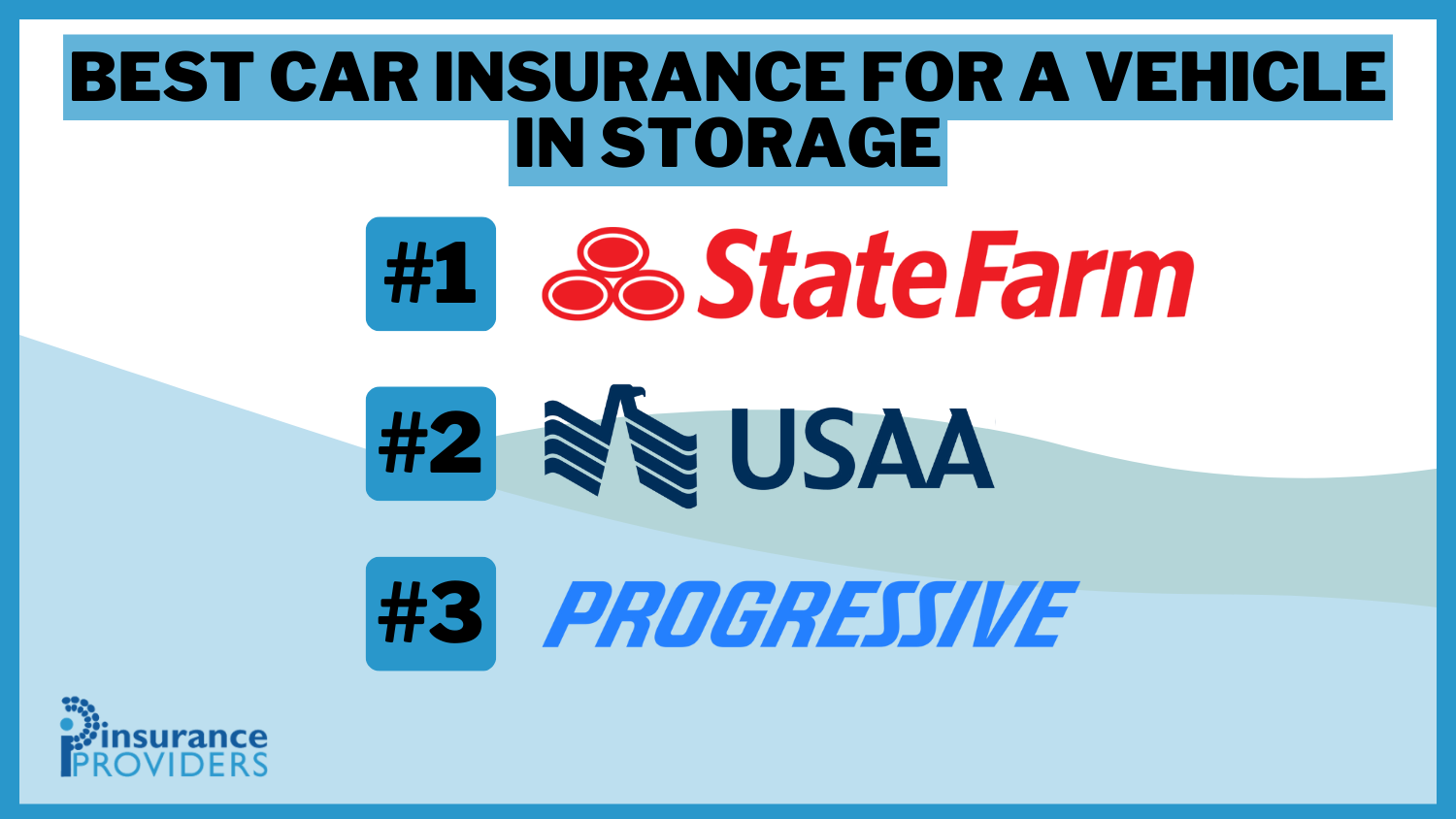Best Auto Insurance for a Vehicle in Storage in 2026 (Top 10 Companies)
State Farm, USAA, and Progressive stand out as the best auto insurance companies for a vehicle in storage. Their diverse coverage, outstanding customer service, and lucrative multi-policy discounts make them leaders in safeguarding your stored vehicle.
Read more Secured with SHA-256 Encryption





Table of Contents
Table of Contents


Licensed Real Estate Agent
Angie Watts is a licensed real estate agent with Florida Executive Realty. Specializing in residential properties since 2015, Angie is a real estate writer who published a book educating homeowners on how to make the most money when they sell their homes. Her goal is to educate and empower both home buyers and sellers so they can have a stress-free shopping and/or selling process. She has studi...
Angie Watts


Licensed Insurance Broker
Zach Fagiano has been in the insurance industry for over 10 years, specializing in property and casualty and risk management consulting. He started out specializing in small businesses and moved up to large commercial real estate risks. During that time, he acquired property & casualty, life & health, and surplus lines brokers licenses. He’s now the Senior Vice President overseeing globa...
Zach Fagiano
Updated February 2024
 6,589 reviews
6,589 reviewsCompany Facts
Average Monthly Rate For Good Drivers
A.M. Best Rating
Complaint Level
Pros & Cons
 6,589 reviews
6,589 reviews 13,283 reviews
13,283 reviewsCompany Facts
Average Monthly Rate For Good Drivers
A.M. Best Rating
Complaint Level
Pros & Cons
 13,283 reviews
13,283 reviewsSecure the best auto insurance for a vehicle in storage with top companies like State Farm, USAA, and Progressive. Considering factors such as credit score, mileage, coverage, and driving record. The companies excel in diverse coverage, customer service, and multi-policy discounts.

Our Top 10 Best Companies: Best Auto Insurance for a Vehicle in Storage
| Company | Rank | See Pros/Cons | Storage Discount | Multi-Policy Discount | Best for |
|---|---|---|---|---|---|
| #1 | State Farm | Up to 10% | Up to 15% | Comprehensive Coverage | |
| #2 | USAA | Up to 15% | Up to 10% | Customer Service | |
| #3 | Progressive | Up to 12% | Up to 12% | Multi-Policy Discounts | |
| #4 | Allstate | Up to 8% | Up to 20% | Bundling Policies | |
 | #5 | Liberty Mutual | Up to 10% | Up to 15% | Customizable Policies |
 | #6 | Nationwide | Up to 10% | Up to 10% | Vanishing Deductibles |
| #7 | Farmers | Up to 15% | Up to 18% | 24/7 Support | |
 | #8 | Travelers | Up to 12% | Up to 15% | Add-on Coverages |
| #9 | American Family | Up to 8% | Up to 12% | Loyalty Discounts | |
| #10 | Esurance | Up to 10% | Up to 10% | Online Convenience |
Are you planning to store your vehicle for an extended period? If so, it’s crucial to ensure that your prized possession is protected with the right insurance coverage. While your regular auto insurance policy may not provide adequate coverage for a vehicle in storage, there are specific insurance options designed just for this purpose.
In this article, we will explore the ins and outs of auto insurance for stored vehicles, discuss why it’s necessary, factors to consider when choosing a policy and provide an overview of the top auto insurance providers in this niche. So, let’s dive in and find the best auto insurance for your vehicle in storage.
#1 – State Farm: Diverse Coverage Expert
State Farm stands out as the top choice for auto insurance for stored vehicles, offering comprehensive coverage tailored to diverse storage needs.Ty Stewart Licensed Life Insurance Agent
Pros
- Bundling policies: Offers significant discounts for bundling multiple insurance policies.
- High low-mileage discount: Provides a substantial discount for low-mileage usage.
- Wide coverage options: Offers various coverage options tailored for different business needs.
Cons
- Limited multi-policy discount: The multi-policy discount is not as high compared to some competitors.
- Potential premium costs: Despite discounts, premiums might still be relatively higher for certain coverage levels.
Read more: State Farm Auto Insurance Review
Free Auto Insurance Comparison
Compare Quotes From Top Companies and Save
Secured with SHA-256 Encryption
#2 – USAA: Customer Service Champion
Pros
- Up to 15% multi-policy discount: Offers a generous discount for bundling multiple insurance policies.
- Up to 10% low-mileage discount: Provides a considerable discount for low-mileage usage.
- Exceptional customer service: Known for top-notch customer service and satisfaction.
Cons
- Limited customization options: Offers fewer customizable policy options compared to some competitors.
- Membership eligibility: Only available to military members, veterans, and their families.
Read more: USAA Auto Insurance Review
#3 – Progressive: Multi-Policy Discounts Leader
Pros
- Up to 12% multi-policy discount: Offers competitive discounts for bundling multiple insurance policies.
- Up to 12% low-mileage discount: Provides a substantial discount for low-mileage usage.
- Comprehensive coverage options: Provides a wide range of coverage options for various needs.
Cons
- May not be the cheapest option: While discounts are available, Progressive may not always have the lowest premiums.
- Limited coverage in certain areas: Availability and coverage options may vary depending on the location.
Read more: Progressive Auto Insurance Review
#4 – Allstate: Bundling Policies Specialist
Pros
- Up to 8% multi-policy discount: Offers a decent discount for bundling multiple insurance policies.
- Up to 20% low-mileage discount: Provides a significant discount for low-mileage usage.
- Comprehensive coverage options: Provides a variety of coverage options for different needs.
Cons
- Premiums can be higher: Despite discounts, Allstate’s premiums may be relatively higher than some competitors.
- Limited discounts for certain policies: Some specific policies may not qualify for substantial discounts.
Read more: Allstate Auto Insurance Review
Free Auto Insurance Comparison
Compare Quotes From Top Companies and Save
Secured with SHA-256 Encryption
#5 – Liberty Mutual: Customizable Policies Provider
Pros
- Up to 10% multi-policy discount: Offers a reasonable discount for bundling multiple insurance policies.
- Up to 15% low-mileage discount: Provides a substantial discount for low-mileage usage.
- Customizable policies: Allows customers to tailor their insurance policies to fit their specific needs.
Cons
- Discounts may vary: The availability and size of discounts may vary depending on the location and policy.
- Limited local agents: Liberty Mutual may not have as many local agents compared to some competitors.
#6 – Nationwide: Vanishing Deductibles Specialist
Pros
- Up to 10% multi-policy discount: Offers a decent discount for bundling multiple insurance policies.
- Up to 10% low-mileage discount: Provides a reasonable discount for low-mileage usage.
- Vanishing deductibles: Rewards safe driving by reducing deductibles over time without claims.
Cons
- Limited customization options: Nationwide may have fewer options for customizing policies compared to some competitors.
- Potentially higher premiums: While discounts are available, premiums may be relatively higher for certain coverage levels.
#7 – Farmers: 24/7 Support Provider
Pros
- Up to 15% multi-policy discount: Offers a competitive discount for bundling multiple insurance policies.
- Up to 18% low-mileage discount: Provides a substantial discount for low-mileage usage.
- 24/7 customer support: Provides round-the-clock support for policyholders.
Cons
- Potentially complex discounts: Farmers’ discount structure may be complex, making it challenging to understand for some customers.
- Premiums may be higher: Despite discounts, premiums may be relatively higher compared to some competitors.
Read more: Farmers Auto Insurance Review
Free Auto Insurance Comparison
Compare Quotes From Top Companies and Save
Secured with SHA-256 Encryption
#8 – Travelers: Add-on Coverages Expert
Pros
- Up to 12% multi-policy discount: Offers a decent discount for bundling multiple insurance policies.
- Up to 15% low-mileage discount: Provides a significant discount for low-mileage usage.
- Extensive add-on coverages: Provides a variety of additional coverages to enhance policy protection.
Cons
- Limited local agents: Travelers may not have as many local agents as some competitors, impacting personalized service.
- Potentially higher premiums: Premiums may be relatively higher, even with available discounts, for certain coverage levels.
Read more: Travelers Auto Insurance Review
#9 – American Family: Loyalty Discounts Provider
Pros
- Up to 8% multi-policy discount: Offers a reasonable discount for bundling multiple insurance policies.
- Up to 12% low-mileage discount: Provides a substantial discount for low-mileage usage.
- Loyalty discounts: Rewards long-term policyholders with additional discounts over time.
Cons
- Limited availability: American Family may not be available in all locations, limiting choices for some customers.
- Fewer coverage options: Offers fewer coverage options compared to some competitors, potentially limiting customization.
#10 – Esurance: Online Convenience Specialist
Pros
- Up to 10% multi-policy discount: Offers a decent discount for bundling multiple insurance policies.
- Up to 10% low-mileage discount: Provides a reasonable discount for low-mileage usage.
- Online convenience: Provides a user-friendly online platform for policy management and claims.
Cons
- Limited local presence: Esurance may not have as many local agents, impacting personalized service for some customers.
- Potentially higher premiums: Premiums may be relatively higher, even with available discounts, for certain coverage levels.
Read more: Esurance Auto Insurance Review
Free Auto Insurance Comparison
Compare Quotes From Top Companies and Save
Secured with SHA-256 Encryption
Comparing Coverage Rates for Stored Vehicles
If you’re planning to store your vehicle for an extended period, it’s essential to choose the right insurance coverage that suits your needs and budget. Let’s delve into the average monthly auto insurance rates for full and minimum coverage offered by some leading insurance providers.
Average Monthly Auto Insurance Rates for Vehicle in Storage
| Insurance Company | Full Coverage | Minimum Coverage |
|---|---|---|
| State Farm | $86 | $33 |
| USAA | $59 | $22 |
| Progressive | $105 | $39 |
| Allstate | $160 | $61 |
| Liberty Mutual | $174 | $68 |
| Nationwide | $115 | $44 |
| Farmers | $139 | $44 |
| Travelers | $99 | $37 |
| American Family | $117 | $44 |
| Esurance | $114 | $46 |
For Full Coverage Rates, State Farm comes in at $86, USAA offers it for $59, Progressive at $105, Allstate at $160, Liberty Mutual at $174, Nationwide at $115, Farmers at $139, Travelers at $99, American Family at $117, and Esurance at $114.
On the other hand, Minimum Coverage Rates show State Farm at $33, USAA at $22, Progressive at $39, Allstate at $61, Liberty Mutual at $68, Nationwide at $44, Farmers at $44, Travelers at $37, American Family at $44, and Esurance at $46.
These rates provide an overview of the cost considerations for both full and minimum coverage, allowing you to make an informed decision based on your specific insurance needs and financial preferences.
Understanding Auto Insurance for Stored Vehicles
Before delving into the details, let’s first clarify what auto insurance for stored vehicles entails. When your vehicle is not being used and safely tucked away in storage, the risks and liabilities associated with regular car insurance are significantly reduced. As a result, insurance companies offer specialized coverage for such situations, also known as comprehensive storage coverage.
When it comes to storing your vehicle, there are various reasons why you might choose to do so. Perhaps you’re going on an extended vacation, leaving the country for work, or simply have a classic car that you only drive on special occasions. Regardless of the reason, it’s important to understand the importance of having insurance coverage for your stored vehicle.
What is Auto Insurance for Stored Vehicles?
Auto insurance for stored vehicles provides protection against unexpected events that can cause damage or loss during the period your vehicle is not in use. It typically includes coverage for damages caused by fire, theft, vandalism, natural disasters, and other risks that may occur while your vehicle is in storage.
Imagine this scenario: You’ve carefully stored your beloved vintage car in a secure facility, thinking it’s safe from harm. However, one night, a fire breaks out in the storage facility due to an electrical malfunction. Without proper insurance coverage, you would be left with a significant financial burden to repair or replace your cherished vehicle. This is where auto insurance for stored vehicles comes in, providing you with the necessary protection and peace of mind. (For more information, read our “Will auto insurance pay for electrical repairs?“).
Why Do You Need Insurance for a Stored Vehicle?
You might be wondering why you need insurance for a vehicle that is not on the road. While your vehicle is in storage, it is still vulnerable to risks such as fires, theft, or accidental damage. Additionally, without proper coverage, you may be personally liable for any damages that occur during this time. Having insurance specifically tailored for stored vehicles provides peace of mind and financial protection against such unforeseen circumstances.
Consider this scenario: You’ve decided to store your motorcycle for the winter season. You’ve taken all the necessary precautions, ensuring it’s securely covered and protected from the elements. However, one day, a severe storm hits the area, causing a tree to fall onto the storage unit, damaging your motorcycle. Without insurance, you would be left with the burden of repairing or replacing your bike out of pocket. By having insurance for your stored vehicle, you can mitigate these risks and ensure that you’re financially protected.
Furthermore, having insurance for your stored vehicle can also provide coverage for any potential liability issues that may arise. For example, if someone were to break into the storage facility and damage your vehicle, you may not be held responsible for the repairs or replacement costs if you have the appropriate insurance coverage.
In conclusion, while your vehicle may be safely stored away, it is not immune to risks. Auto insurance for stored vehicles offers the necessary protection and peace of mind, ensuring that you’re financially safeguarded against unexpected events that may occur during the storage period. Whether it’s a classic car, a motorcycle, or any other vehicle, having the right insurance coverage is essential to ensure that you can enjoy your stored vehicle without worrying about potential financial burdens.
Factors to Consider When Choosing Insurance for a Stored Vehicle
When selecting the best auto insurance for your storage needs, there are several factors to take into consideration. Let’s explore these factors in detail:
Location of Storage
The location of your storage facility can impact your insurance policy. If the storage area has a high crime rate or is prone to natural disasters, your premiums may be higher due to the increased risks involved. On the other hand, if the storage facility has excellent security measures in place, your insurance provider may offer more favorable rates.
For instance, if you plan to store your vehicle in a storage facility located in a densely populated urban area, the risk of theft or vandalism might be higher. Insurance companies take this into account when calculating your premiums. However, if you choose a storage facility in a gated community or a facility with 24/7 surveillance, the insurance provider may consider it a lower risk and offer you a more competitive rate.
Moreover, the geographical location of the storage facility can also affect the insurance coverage. If the area is prone to natural disasters such as hurricanes or floods, the insurance company may require additional coverage to protect your vehicle from potential damage.
Duration of Storage
The length of time your vehicle will be in storage is another crucial factor to consider when choosing insurance. Some policies offer short-term coverage for a few months, while others provide coverage for longer periods. Be sure to select a policy that aligns with your specific storage duration needs.
When discussing the duration of storage with your insurance provider, it is essential to consider any potential changes in your plans. If you initially plan to store your vehicle for a few months but end up extending the storage period, you need to inform your insurance provider. Failure to do so may result in your policy becoming void or additional charges being applied.
Additionally, if you plan to use your vehicle intermittently during the storage period, make sure to clarify this with your insurance provider. Some policies may have restrictions on the usage of the vehicle while it is in storage, and violating these terms may affect your coverage.
Type of Vehicle
The type of vehicle you plan to store plays a significant role in determining the insurance coverage you require. Classic cars, luxury vehicles, and high-performance cars may have different insurance requirements due to their higher value. Make sure to discuss the specifics of your vehicle with potential insurance providers to ensure you have adequate coverage.
Classic cars, with their unique value and often limited production, require specialized insurance coverage. These policies may take into account factors such as the vehicle’s age, condition, and rarity. It is essential to provide accurate information about your classic car to ensure you receive the appropriate coverage.
Luxury vehicles, on the other hand, may require additional coverage for features such as high-end audio systems, custom modifications, or advanced safety technology. The insurance provider may need detailed documentation of these features to include them in the coverage.
High-performance cars, known for their speed and power, may also have specific insurance requirements. These vehicles often require higher coverage limits due to their increased risk of accidents or theft. Additionally, insurance providers may require evidence of advanced driver training or safe storage practices for high-performance vehicles.
By considering these factors – the location of storage, the duration of storage, and the type of vehicle – you can make an informed decision when choosing insurance for your stored vehicle. Remember to consult multiple insurance providers, compare quotes, and thoroughly read the policy terms and conditions to ensure you have the coverage that meets your specific needs.
Free Auto Insurance Comparison
Compare Quotes From Top Companies and Save
Secured with SHA-256 Encryption
Top Auto Insurance Providers for Stored Vehicles
When it comes to storing your vehicle, it’s important to have the right insurance coverage to protect it from any unforeseen risks. Now that we are aware of the factors to consider, let’s dive deeper into some of the top auto insurance providers that offer coverage specifically tailored for stored vehicles:
Provider 1: Comprehensive Protection
Provider 1 specializes in insurance coverage for vehicles in storage. They understand that storing a vehicle comes with its own set of risks, such as damage from environmental factors or theft. That’s why they offer comprehensive policies that provide protection against various risks. Whether your vehicle is stored in a garage, a storage facility, or even in your backyard, Provider 1 has flexible coverage options to suit different storage durations. You can have peace of mind knowing that your cherished vehicle is protected no matter where it is stored.
Provider 2: Exceptional Coverage and Customer Service
When it comes to storing your vehicle, you want an insurance provider that not only offers great coverage but also understands the unique requirements of owners storing their vehicles. Provider 2 is known for exactly that. They have a dedicated team of experts who specialize in insurance for stored vehicles. They understand the importance of customization and can tailor policies to meet your specific needs. With Provider 2, you can expect exceptional coverage and customer service that goes above and beyond.
Provider 3: Trusted Name and Competitive Pricing
When it comes to insuring stored vehicles, you want a provider that you can trust. Provider 3 is a well-established name in the industry and has earned the trust of countless vehicle owners. They offer competitive pricing options, ensuring that you get the coverage you need at a price that fits your budget. With Provider 3, you have a wide range of coverage choices to choose from. Whether you need basic protection or want to add additional coverage options, Provider 3 has got you covered. They understand that every vehicle owner has unique needs, and they strive to find the perfect fit for you.
Choosing the right auto insurance provider for your stored vehicle is crucial. With the expertise and tailored coverage options offered by Provider 1, the exceptional coverage and customer service provided by Provider 2, and the trusted name and competitive pricing from Provider 3, you can rest easy knowing that your vehicle is in good hands. Don’t take any chances when it comes to protecting your valuable asset during storage. Explore these top auto insurance providers and find the one that suits your needs best.
Comparing Auto Insurance Policies for Stored Vehicles
When comparing auto insurance policies for stored vehicles, it’s essential to consider various aspects to make an informed decision. Let’s explore some key factors to evaluate:
When it comes to storing your vehicle, whether it’s a classic car, a motorcycle, or an RV, you want to ensure that it’s protected from any potential risks. That’s where auto insurance policies for stored vehicles come into play. These specialized policies are designed to provide coverage specifically tailored to the unique needs of stored vehicles.
One of the first factors to consider when comparing auto insurance policies for stored vehicles is the coverage options offered by each insurance provider. Each provider may offer different coverage options, so it’s crucial to ensure that the policy you select covers the specific risks you are concerned about. Fire, theft, and natural disasters are common risks that vehicle owners want to protect their stored vehicles against.
Pricing is another crucial aspect to consider. While you want to ensure that you have adequate coverage for your stored vehicle, you also want to make sure that you’re getting the best value for your money. Comparing the pricing of different insurance policies is essential to find a policy that fits within your budget.
But pricing isn’t the only consideration. Many insurance providers offer discounts specific to stored vehicles. These discounts can help you save even more money on your policy. So, when comparing policies, be sure to inquire about any discounts that may be available.
Customer service and the claims process are also important factors to evaluate. Dealing with insurance claims can be a stressful experience, so it’s crucial to choose an insurance provider that offers good customer service and a seamless claims process. Reading reviews and customer experiences can provide valuable insights into the quality of service provided by each insurance provider.
By considering these factors and comparing various auto insurance policies, you can find the best coverage for your stored vehicle needs. Remember, the right insurance policy for your situation may not be the same as someone else’s, so take the time to assess your requirements carefully.
With the right coverage, you can have peace of mind knowing your cherished vehicle is protected during its time in storage. Whether you’re storing your vehicle for the winter months or for an extended period, having the right insurance policy in place ensures that you’re prepared for any unforeseen circumstances that may arise.
Case Studies: Tailored Coverage for a Vehicle in Storage
Case Study 1: Protecting Classic Elegance With State Farm
Richard decided to store his classic car during the harsh winter months to preserve its pristine condition. Concerned about potential risks like damage from environmental factors or theft, Richard needed a policy that went beyond standard coverage.
State Farm, known for its diverse coverage options, provided Richard with a specialized policy addressing the unique vulnerabilities of classic cars in storage. The policy included protection against winter-related damages, ensuring Richard’s cherished classic remained in impeccable condition throughout the storage period.
Case Study 2: Military Precision and Security With USAA
Captain Rodriguez received deployment orders and needed to store his vehicle during the overseas assignment. With USAA’s understanding of military lifestyles, Captain Rodriguez was confident in the coverage provided.
USAA’s storage-specific policy not only protected the vehicle against common risks but also offered flexibility to accommodate the uncertainties of deployment. The seamless claims process and top-notch customer service ensured Captain Rodriguez had peace of mind while fulfilling his duty.
Case Study 3: Progressive Solutions for Urban Living
Sarah decided to store her car for extended periods due to her reliance on public transport. Progressive’s innovative approach to coverage suited her needs perfectly.
The policy allowed for a customized storage plan, reflecting Sarah’s intermittent usage patterns. Progressive’s competitive pricing and multi-policy discounts further aligned with Sarah’s budgetary considerations, providing her with a cost-effective solution tailored to her urban living requirements.

Frequently Asked Questions
What is auto insurance for a vehicle in storage?
Auto insurance for a vehicle in storage is a type of coverage specifically designed for vehicles that are not being driven or used for an extended period. It provides protection against risks such as theft, vandalism, fire, and damage caused by natural disasters while the vehicle is in storage.
Why would I need auto insurance for a vehicle in storage?
Even if your vehicle is not being driven, it can still be at risk of various perils. Auto insurance for a vehicle in storage ensures that you are financially protected in case of any unforeseen incidents or damages that may occur during the storage period.
What does auto insurance for a vehicle in storage cover?
The coverage provided by auto insurance for a vehicle in storage typically includes protection against theft, vandalism, fire, natural disasters, and other specified perils. It may also include coverage for damage caused by rodents or pests, as well as optional coverage for accidental damage.
Can I reduce my insurance coverage while my vehicle is in storage?
Yes, you can often reduce your insurance coverage while your vehicle is in storage. By adjusting your coverage to a comprehensive-only policy, you can save on premiums while still maintaining essential protection against potential risks during the storage period.
Are there any requirements or conditions for getting auto insurance for a vehicle in storage?
Insurance providers may have specific requirements or conditions for obtaining auto insurance for a vehicle in storage. These may include providing proof of storage location, ensuring the vehicle is inoperable, and adhering to any storage guidelines or recommendations provided by the insurance company.
Can I cancel my regular auto insurance policy while my vehicle is in storage?
While it may be possible to cancel your regular auto insurance policy while your vehicle is in storage, it is generally not recommended. Completely canceling your policy may result in a coverage gap and potential financial risks if any incidents occur during the storage period. It is advisable to switch to a comprehensive-only policy instead.
Get a FREE Quote in Minutes
Insurance rates change constantly — we help you stay ahead by making it easy to compare top options and save.




